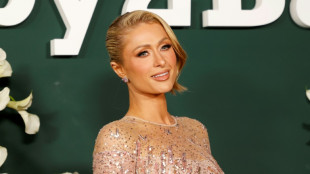UK's Sunak attacked by rivals after apology for skipping D-Day event
British Prime Minister Rishi Sunak was roundly criticised by political rivals on Friday, hours after apologising for leaving D-Day commemorations in France early in the latest self-inflicted setback to his stuttering general election campaign.
Political opponents at a live TV debate derided Sunak's decision to skip the major ceremony with world leaders on Thursday, with even one of his own senior Conservatives branding it "completely wrong".
The Tory leader had earlier apologised repeatedly -- in a social media post and then subsequent interviews -- calling his premature return to the UK to give a domestic television interview "a mistake".
Two polls on Friday showed Britons agreed, with around two-thirds in both calling it "unacceptable" -- another ominous sign for the beleaguered Sunak ahead of the July 4 ballot. Surveys show his Conservatives are set for a heavy defeat.
"(It) was a complete and utter disgrace and shows us we actually have a very unpatriotic prime minister," Brexit figurehead Nigel Farage, who heads the anti-immigration Reform UK party, said at Friday evening's BBC debate.
Scottish National Party leader Stephen Flynn accused Sunak of putting "his own political career before Normandy war veterans", as other opposition parties joined in the chorus of criticism.
Even the ruling Tories' representative on stage, Penny Mordaunt, offered no defence for the blunder.
"What happened was completely wrong and the prime minister has rightly apologised," she said, before adding it should not become "a political football".
- 'I apologise' -
The scandal erupted after Sunak attended a UK-organised memorial in northern France but then skipped the main Normandy ceremony attended by France's President Emmanuel Macron, US President Joe Biden and Ukraine leader Volodymyr Zelensky.
The British leader instead sent Foreign Secretary David Cameron, who was pictured alongside other world leaders.
It soon emerged Sunak, 44, had returned home to be quizzed in a TV interview not due to air until Wednesday.
One D-Day veteran told Sky News that the prime minister's absence "lets the country down".
Sunak's main election opponent, Labour leader Keir Starmer, did attend the event and was photographed meeting Zelensky.
Starmer said on X he told the Ukrainian president that "there will be no change in Britain's support for Ukraine" if he becomes the next UK prime minister.
He later told reporters his rival would "have to answer for his own actions", adding: "For me there was nowhere else I was going to be."
In his apology, Sunak insisted he "cares deeply about veterans" and noted his attendance at two D-Day memorial events this week.
"On reflection, it was a mistake not to stay in France longer –- and I apologise," he conceded.
- 'Prime ministerial'? -
Commentators suggested it showed Sunak's lack of political nous.
"It's a very important moment for the country. But it's also a very important moment to show that you're being prime ministerial," Craig Oliver, the former adviser to Cameron when he was prime minister, told BBC radio.
Sunak, an internal Tory appointee as prime minister in October 2022, called the election in a widely-mocked, rain-sodden speech from Downing Street last month.
He has since visited the site in Belfast where the Titanic was built, drawing comparisons between his leadership and captaining a sinking ship.
Sunak was also ridiculed for asking Welsh people if they were looking forward to the European Championships football tournament, when Wales have not qualified.
Earlier this week he faced accusations of lying about Labour's tax plans during a head-to-head debate with Starmer.
Eyeing a first taste of power since 2010, the opposition party's ruling executive finalised its manifesto on Friday ahead of its release next week.
Starmer confirmed that recognition of Palestinian statehood as part of any Middle East peace process would be included.
Friday's seven-way debate saw the main parties' representatives clash on various issues, from immigration to healthcare.
In a sign of Labour's ascendant position, Mordaunt repeatedly attacked its policies, following in Sunak's footsteps by arguing taxes will rise on households -- despite firm Labour denials.
Deputy Labour leader Angela Rayner, who also fended off attacks from Farage and other opposition parties, remained focused on the Conservatives' record over 14 years in charge.
"You have failed the British people, and people can see that" she argued.
S.dEsposito--LDdC



